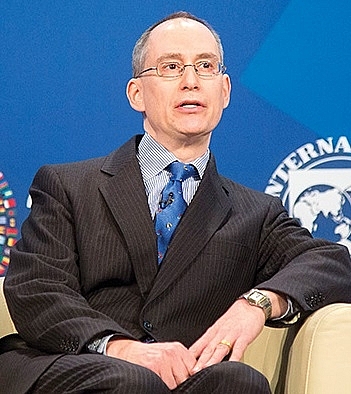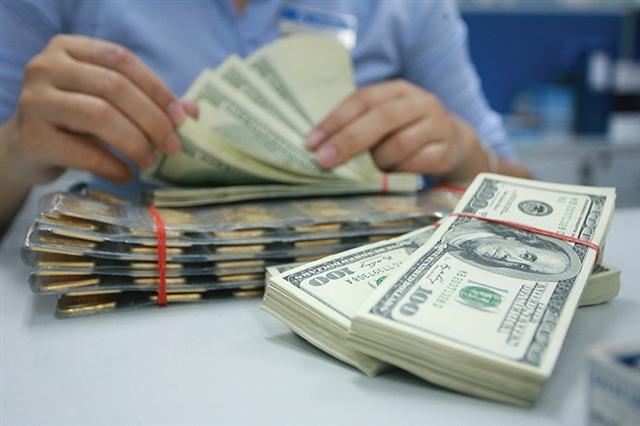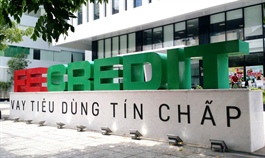Crafting specific measures to ensure top-quality growth
Crafting specific measures to ensure top-quality growth
Despite numerous obstacles caused by global supply disruptions due to the prolonged health crisis, the Vietnamese economy continues to stride forward. Jonathan Ostry, deputy director of the International Monetary Fund’s Asia and Pacific Department, talked with VIR’s Thanh Tung about how the country can further improve its growth quality to ensure sustainable development.

Jonathan Ostry, deputy director of the International Monetary Fund’s Asia and Pacific Department
|
The Vietnamese economy grew 2.91 per cent in 2020 and 4.48 per cent in the first quarter of 2021. How does the International Monetary Fund (IMF) view the economy in its use of fiscal monetary policy and other tools, and what are the IMF’s recommendations for the country to achieve set growth targets?
Vietnam performed much better than virtually all of the countries in our region last year, a rare positive growth number in a sea of negatives. And this was due mainly to the incredibly proactive and effective set of containment policies introduced very early in 2020, and really showed what can be achieved with a strong health response.
And it sorts of manifests itself in a strong pickup in growth. The fact that prolonged lockdowns were not needed, so reopening could proceed much faster than elsewhere. And when, inevitably, one or two localised outbreaks occurred, the authorities were vigorous in attending to those and did so very effectively. And there was a payoff also in that macroeconomic policy support on a huge scale was not needed in Vietnam. So again, it is a situation where the investment in a strong healthcare response repays itself many times over.
Now, for 2021, the IMF is projecting very healthy growth in Vietnam, I think on the order of 6 or 7 per cent. The message that we have is to make sure that you are continuing to support those who are vulnerable in your economy, as you have been doing, and continue with the vaccine rollout which has just started in Vietnam, and is, hopefully, going to be accelerated very, very quickly.
There is also the need to lay the foundation for strong medium-term growth, including making sure you have the tax and revenue resources to build your infrastructure and build public investment, ensure your financial system is resilient, and continue with efforts to build the pro private investment environment in Vietnam on a structural basis, which will also have a payoff in terms of reducing external imbalances and the strength of the external position in Vietnam.
In a bid to spur economic growth, the government is mulling over a new plan to assist enterprises during the pandemic. What types of solutions should be taken in the plan, and will there be any risks of high inflation if the government loosens its fiscal policy?
Vietnam’s fiscal position is sound at present, supported by sustainable debt dynamics. Moreover, inflationary pressures are muted and in line with the central bank’s limit for 2021 of 4 per cent. Our recommendation remains that the fiscal stance can be loosened, if necessary, to support economic activity and limit permanent scarring from the pandemic. Much of course depends on the pace of economic recovery at the global level, which is still subject to considerable uncertainty.
As far as specific tax measures are concerned, weak uptake of tax deferrals in Vietnam, especially in the hardest-hit sectors of the economy, would argue against their extension.
Some of the measures we would instead encourage include introduction of temporary corporate income tax (CIT) loss-carry backwards to improve firms’ cash flows; better targeting of temporary CIT reductions to benefit distressed but viable small- and medium-sized enterprises; and introduction of temporary provisions for accelerated depreciation or investment tax credits to lower to user cost of capital and encourage investment.

Vietnam is looking at stellar prospects due to its success in handling the pandemic and fast reopening, photo Le Toan
|
How does the IMF assess the quality of Vietnam’s economic growth, and how is the quality related to the capacity of the country in attracting foreign direct investment?
Vietnam’s growth story over the last three decades has been remarkable as it is one of sustained and inclusive growth that has boosted the living standards of its population. Thanks to market-oriented reforms which strengthened the business environment and helped attract significant foreign investment, Vietnam has moved from being one of the poorest countries in the world to achieving lower middle-income status.
To remain competitive regionally and globally, we would advise taking steps to further improve the business environment and ensure a level playing field. This includes reforms geared towards simplifying and reducing the regulatory burden faced by domestic private firms, easing the entry and exit costs for formal firms, continued reform of state-owned enterprises, and enhancing good governance.
Reducing labour skill-mismatches along with increasing human capital and technology access would also boost labour productivity, facilitating investments into more complex products that can better withstand international competition.
|
The IMF Executive Board’s conclusion of Article IV in consultation with Vietnam, March 2021 Executive directors noted that the COVID-19 pandemic disrupted a prolonged period of high growth and improvements in living standards. They commended the authorities for their decisive and comprehensive response to the pandemic, which, supported by strong fundamentals and policy buffers, has been instrumental in ensuring the economy’s resilience. They noted that risks to the outlook are tilted to the downside and stressed the need for measures to limit permanent scarring and promote sustained, inclusive, and greener growth. The directors underscored the need for fiscal measures geared towards protecting workers and vulnerable households, including through improved budgetary execution and enhanced targeting. They stressed that once the recovery is firmly underway, gradual fiscal adjustment should center on revenue mobilisation to help create space for priority social and infrastructure spending and support greener and more inclusive growth. Directors noted the need for continued efforts to upgrade fiscal policy frameworks to safeguard fiscal sustainability. Recommended was the maintaining of an accommodative monetary policy stance, while remaining mindful of underlying banking sector vulnerabilities. They emphasised that corporate support for viable firms should be gradually phased out and regulatory forbearance normalised. Directors underscored that financial risks should be closely monitored and problem loans addressed in a timely manner. Medium term objectives include enhancing private debt restructuring frameworks and further strengthening banks’ capital position in the context of adopting Basel II requirements. Noting the staff’s assessment that Vietnam’s external position was substantially stronger than warranted by fundamentals and desirable policies, directors called for steadfast reform efforts to remove the remaining barriers to private investment and enhance social safety nets. At the same time, some directors urged caution in interpreting EBA (External Balance Assessment) model results, which may not adequately capture Vietnam-specific structural factors and measurement issues. In the context of reserve adequacy, directors welcomed efforts to allow greater two-way exchange rate flexibility and modernise the monetary policy framework, which would help the economy to adjust to the changing external environment. They also stressed the importance of structural reforms to improve the business environment, enhance productivity, and boost post-pandemic potential growth. They concurred that priority should be given to reducing labour skill-mismatches, promoting digital transformation, and ensuring a level playing field, particularly for small- and medium-sized enterprises. Directors welcomed continued efforts to improve economic institutions and strengthen governance. ⃰ Under Article IV of the IMF’s Articles of Agreement, the IMF holds bilateral discussions with members, usually every year. A team visits the country, collects economic and financial information, and discusses with officials the country’s economic developments and policies. On return to headquarters, the staff prepares a report, which forms the basis for discussion by the Executive Board. |


























